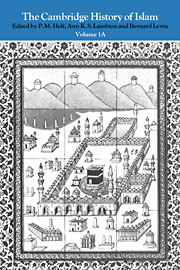Book contents
- Frontmatter
- Introduction
- Part I The rise and domination of the Arabs
- Part II The coming of the steppe peoples
- Part III The central Islamic lands in the Ottoman period
- 1 The rise of the Ottoman empire
- 2 The heyday and decline of the Ottoman empire
- 3 The later Ottoman empire in Rumelia and Anatolia
- 4 The later Ottoman empire in Egypt and the fertile crescent
- 5 Safavid Persia
- 6 Persia: the breakdown of society
- 7 Central Asia from the sixteenth century to the Russian conquests
- Appendix The Golden Horde and its successors
- 8 Tsarist Russia and the Muslims of central Asia
- References
6 - Persia: the breakdown of society
from Part III - The central Islamic lands in the Ottoman period
Published online by Cambridge University Press: 28 March 2008
- Frontmatter
- Introduction
- Part I The rise and domination of the Arabs
- Part II The coming of the steppe peoples
- Part III The central Islamic lands in the Ottoman period
- 1 The rise of the Ottoman empire
- 2 The heyday and decline of the Ottoman empire
- 3 The later Ottoman empire in Rumelia and Anatolia
- 4 The later Ottoman empire in Egypt and the fertile crescent
- 5 Safavid Persia
- 6 Persia: the breakdown of society
- 7 Central Asia from the sixteenth century to the Russian conquests
- Appendix The Golden Horde and its successors
- 8 Tsarist Russia and the Muslims of central Asia
- References
Summary
The seeds of the decline of the Safavid empire are already to be seen after the death of Shāh 'Abbās I, and when the Afghan invasion finally brought about its fall 1135/1722 period of disorder followed. Trade was interrupted and a general decline in civic and cultural life took place. This was not a new experience for Persia: earlier empires had disintegrated before the inroads of nomadic or semi-nomadic invaders. On this occasion, however, the invader did not succeed in establishing an empire as had, for example, the Seljuks, the Mongols and the Timurids.
Tahmāsp, the son of Shāh Sultān Husayn, the last Safavid ruler, who was besieged by the Afghans in Isfahān, sought the assistance severally of Peter the Great and the Ottoman sultan. The former captured Darband and Baku and concluded in 1723 a treaty with Tahmāsp, who ceded to Russia all the Persian possessions on the Caspian Sea on condition Peter expelled the Afghans and put him (Tahmāsp) on the Persian throne. In 1724, however, anticipating the disintegration of the Persian kingdom, the Russians and the Ottomans made an abortive treaty for the partition of Persia. In 1140/1727 the Ottomans forced Ashraf, who in 1137/1725 had succeeded Mahmūd, the first Afghan ruler of Persia, to cede to them those provinces which they had occupied in return for an agreement to acknowledge him as shah.
- Type
- Chapter
- Information
- The Cambridge History of Islam , pp. 430 - 467Publisher: Cambridge University PressPrint publication year: 1977

